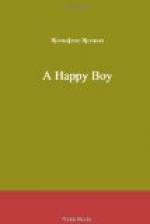“No, indeed I will not.”
She lay kicking up her heels and staring down at him, and presently she said: “But if I give you a twisted bun for the goat, can I have it then?”
Oyvind was the son of poor people; he had tasted twisted bun only once in his life, that was when grandfather came to his house, and he had never eaten anything equal to it before or since. He fixed his eyes on the girl.
“Let me see the bun first?” said he.
She was not slow in producing a large twisted bun that she held in her hand.
“Here it is!” cried she, and tossed it down to him.
“Oh! it broke in pieces!” exclaimed the boy, picking up every fragment with the utmost care. He could not help tasting of the very smallest morsel, and it was so good that he had to try another piece, and before he knew it himself he had devoured the whole bun.
“Now the goat belongs to me,” said the girl.
The boy paused with the last morsel in his mouth; the girl lay there laughing, and the goat stood by her side, with its white breast and shining brown hair, giving sidelong glances down.
“Could you not wait a while,” begged the boy,—his heart beginning to throb. Then the girl laughed more than ever, and hurriedly got up on her knees.
“No, the goat is mine,” said she, and threw her arms about it, then loosening one of her garters she fastened it around its neck. Oyvind watched her. She rose to her feet and began to tug at the goat; it would not go along with her, and stretched its neck over the edge of the cliff toward Oyvind.
“Ba-a-a-a!” said the goat.
Then the little girl took hold of its hair with one hand, pulled at the garter with the other, and said prettily: “Come, now, goat, you shall go into the sitting-room and eat from mother’s dish and my apron.”
And then she sang,—
“Come, boy’s
pretty goatie,
Come,
calf, my delight,
Come here, mewing
pussie,
In
shoes snowy white,
Yellow ducks,
from your shelter,
Come forth, helter-skelter.
Come, doves, ever
beaming,
With soft feathers
gleaming!
The
grass is still wet,
But
sun ’t will soon get;
Now call, though
early ’t is in the summer,
And autumn will
be the new-comer."[1]
[Footnote 1: Auber Forestier’s translation.]
There the boy stood.
He had taken care of the goat ever since winter, when it was born, and it had never occurred to him that he could lose it; but now it was gone in an instant, and he would never see it again.
The mother came trolling up from the beach, with some wooden pails she had been scouring; she saw the boy sitting on the grass, with his legs crossed under him, crying, and went to him.
“What makes you cry?”
“Oh, my goat—my goat!”
“Why, where is the goat?” asked the mother, glancing up at the roof.




